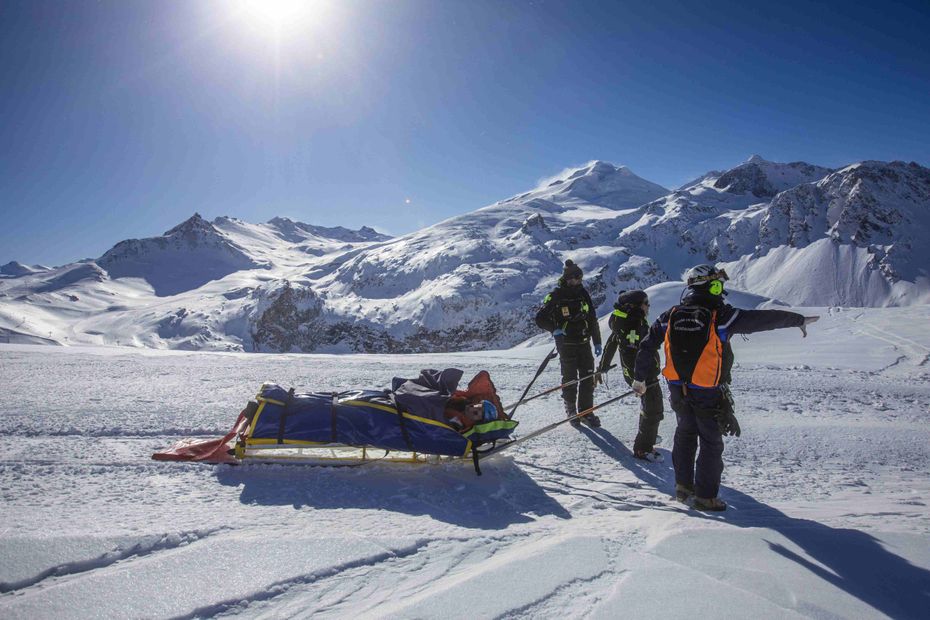In the valley, hospitals fear the worst with the opening of ski resorts and their share of daily accidents. Doctors are alerting themselves and trying to find solutions so that the system does not implode while the Covid-19 pandemic is in full swing.
Does accidentology in ski resorts risk saturating valley hospitals? More than ever, doctors are stepping up to warn about the risks of hospital saturation with the opening of ski resorts. According to them, the hospital is in agony and the trauma related to winter sports risks killing the patient.
On the side of the station medical offices, we are recalling loud and clear that “plus 9 out of 10 injured are fully treated in Mountain Doctors’ offices.“ In Tignes in Savoie, over the 135 days of the winter season, the average is 25 injuries treated per day, or around 3,500 accidents per season.
“It ranges from a sprained thumb to much more serious spinal injuries, but only 4% of the injured are sent to hospitals in Tarentaise or Grenoble”, specifies Doctor Christophe Nardin which has been operating in the Savoyard resort since the 1980s.
Difficult to quantify the number of victims in total on the 325 ski resorts in the country. But we can estimate it at several thousand per winter without being mistaken. But for hospitals already saturated in a period of epidemic rebound, the bill risks being steep.
Mountain doctors are asked to screen and take Covid tests in addition to their daily work.
Doctor Didier Legeais, president of the Isère doctors’ union.
–
Available hospital beds are worth gold and insufficient medical supplies in many departments, not to mention plummeting staff since the start of the Covid-19 crisis. “We are asking mountain doctors to screen and pass Covid tests in addition to their daily work. The arrival of the Omicron variant will not help the situation”, insists Doctor Legeais, president of the Isère doctors’ union.
For this urological surgeon, the problem is complex and multiple. The solutions will take a long time to put in place. “The nurses resign en bloc from the hospital. To give you an example, they earn 1,600 euros per month in our establishments, whereas in a screening center, it is double. “ And the same goes for emergency physicians who earn twice as much in vaccination centers. “It is imperative to find nursing staff in hospitals.”
The practitioner does not hide it, the situation is critical. Emergencies, which face a lack of staff and resources in some hospitals, are extremely tense. For him, we will have to find urgent solutions if we do not want “go into the wall“.
Among these solutions being studied with the ARS (Agency Regional Health): improved classification of ski accidents, better distribution of patients in available hospitals,” acquisition of additional medical equipment in certain hospitals or even the creation of a platform for direct contact between doctors and orthodontists. Another proposal is the evacuation of injured patients in their region of origin so as not to saturate Alpine hospitals.
The emergency services are already full. 80% of critical patients are not vaccinated, and the situation will worsen with the arrival of Omicron.
At Christmas time, hospitals are under the threat of asphyxiation that the trauma inherent in winter vacations will not fix. Last year, ski resorts had to close their ski lifts because of the mixing of the population they represent, but also the risk of an increase in hospitalizations due to accidentology. One year after a white winter, the context is the same and the pandemic is doubling with the imminent arrival of the Omicron variant.
And the doctor Legeais to conclude : “The emergency departments are already full. 80% of the critically ill are not vaccinated, and the situation will worsen with the arrival of Omicron. We’re in the wall! ” A phrase that resonates badly in the mountains where the economy of ski resorts hangs by a thread.
–


